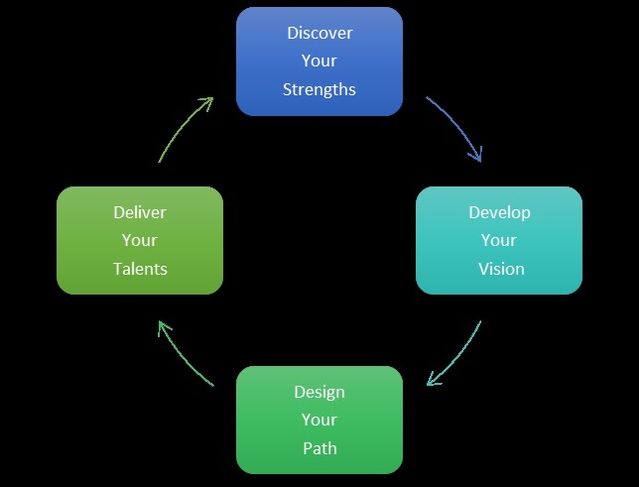In my last blog post, I introduced a simple yet valuable framework for thinking about your career: the 4D’s. The first phase of the 4D framework, Discover Your Strengths, could be called “all about you.”

Before you start a new job, a new phase in life, or a new educational plan, it’s always a good idea to take an inventory of your experience, education, skills, strengths, interests, and values.
This is the place to be honest and accurate: don’t undersell or oversell yourself. What have you done well in the past and can take into your future? It’s important to approach this phase with a learner’s mindset: don’t assume you already know everything about yourself. You are on the hunt for the best in yourself (which also keeping in mind areas you don’t want to develop further). Don’t worry yet about where or how you might apply what you’re learning about yourself; that’s in the next step. For now, keep the focus simply on you.
Note: As you conduct your self-assessment, fears and resistance can pop up as your inner critic will likely pay a visit. If, when thinking about your past, you encounter a problem or negative experience, how did you get through it, or past it? A negative past does not mean a negative future. In fact, learning from the past and evaluating your resilience and grit can be a great way to ensure that the past stays the past. If you made choices in the past that didn’t work, then you can now learn from those choices and make better ones.
Here are some ways to approach the Discover process:
1. Take a look at your resume. Think back on your various experiences and write down the skills you developed or had to demonstrate to be successful. Focus on your moments of success or challenges. What did you do particularly well? What challenges did you overcome and how did you overcome them? Remember, you might be a little rusty on some skills, but if you were good in the past, you can be good in the future. As you think about each of your experiences, ask yourself (and jot down your answers):
- What did I do well?
- What skills did that require?
- What personality traits or characteristics did I have to use?
- What interested me about this?
- Is this something I’m still interested in and want to keep doing?
2. Conduct the same kind of review of other activities that might not be on your resume such as your hobbies, volunteer activities, leadership roles, etc. You can go back as far in your life as necessary. Keep a positive focus, always looking for strengths, interests, and personal traits or characteristics.
3. In addition to thinking about your strengths and what you’ve already accomplished, take some time to also think about what more you would like to do or learn. What skills or interests would you like to develop next? Maybe you enjoyed a project or activity that was only about 10% of your job, but you’d like it to be 80% of your job next time.
4. Get a notebook or create a file on your computer/phone where you can compile lists of:
- Your best skills
- Your best personality traits
- Your interests
- Your values—what is important to you
- Your current education and your educational goals
- Your current experiences and your experience goals (desired experiences)
5. Do you need some help identifying your skills, interests, and values? You can meet with a career coach or counselor who can help you talk them through. Or pair up with a good friend and “coach” each other. Sometimes you just need an outside perspective.
6. You can also take some free online tests that will provide helpful information. Just remember that a test can’t tell you what to do. Take the information and evaluate its accuracy for you. Consider any test an “idea starter,” not an absolute truth. Here are some online tests which can yield valuable information. Some of them are free; don’t invest unless you are sure they will help you or the monetary charge is reasonable in your opinion. (I am not endorsing these sites; just providing links for your convenience.) Sometimes you can “test yourself” by just reading the descriptions and determining where you think you fit.
Big 5 Dimensions of Personality
ONET and My Next Move
Values in Action (VIA) Character Strengths Test
Want more assessments? This blog post from The Muse presents several online career tests you can take (some have costs associated), as does this blog from Monster.com.
As you take these tests and explore your interests and skills, again, remember you might find your inner critic showing up. One good way to deal with this is to ask the critic inside what it’s afraid of. Maybe you have some anxiety around a new job, or your ability to perform well. You can choose to either thank the critic for letting you know about its concerns, and let it know you’re going to try anyway, or you can simply set a goal to learn more and improve your skills. Just remember that change is hard, and the more important the change is in your life, the more likely you will find excuses not to move forward. Knowing this is normal may help you fight through those anxieties and barriers.
Some questions to ask yourself while reviewing the lists you created are:
- What are my top five strengths? Which ones do I want to keep using? How might they help me in the future?
- When have I been at my all-time best? What was I doing? What did I like about it?
- What are my best-hidden talents or traits—ones that others might not know about? Do I want to keep them hidden?
- When have I been most proud of myself? Why? What does that say about me?
- How could I build on this information?
- Would an employer appreciate these skills? How would these skills make me a better employee?
- What is the story I could tell a potential employer about these skills or traits?
Give yourself the gift of time to explore your interests, strengths, skills, and values. The payoff will be worth the investment.
In the next post, we’ll move into the next phase of the 4D framework: “Develop Your Vision” where we will look at how to uncover the setting that might be best for your talents.
© 2018 Katharine S. Brooks, all rights reserved.
Picture credit: Photo by Aaron Burden on Unsplash




